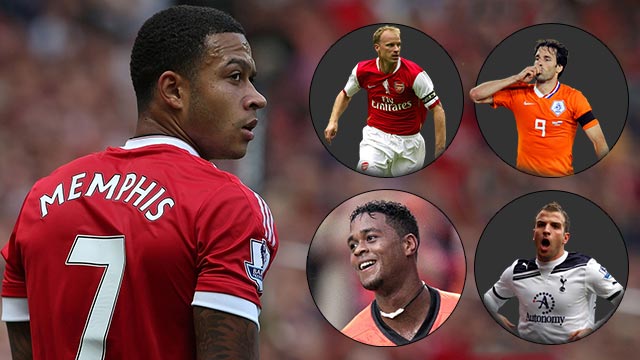When 21 year old Dutch attacker Memphis Depay arrived in Manchester to sign for United in May, for a fee in the region of £25 million, he brought with him a big reputation.
The majority of United fans were happy to have snapped up one of Europe’s hottest young talents early in the off season given their trouble in landing transfer targets in recent history. Depay had just fired PSV Eindhoven to their first Eredivisie title since 2008, finishing top scorer in the division with 22 goals, including a number of stunning free kicks. The previous summer he had become Holland’s youngest ever World Cup goalscorer when he found the net against Australia. The pacy winger was widely tipped to terrorise Premier League defences.
That scenario has not transpired however, and it has been a season of struggle so far for Memphis. He has found the net only once in the Premier League in eight appearances, and has not played a minute in a league game since being hauled off at half time by his manager and countryman Louis van Gaal in the 3-0 defeat at Arsenal on October 4th. He was substituted in the League Cup against Middlesbrough, a match United lost on penalties, and only got 16 minutes on Tuesday night against CSKA Moscow, despite the Red Devils drawing 0-0 at that point and needing to make the breakthrough.
To add to Depay’s recent misfortunes, he has also been left out of Danny Blind’s latest Dutch squad. Blind, father of United left back Daley, has suggested that Depay has to work harder for the team before he can return to the squad.
It is too early in his Premier League career to brandish Depay as a big money failure; and in light of this, we look at other attacking talents that were nurtured in the Netherlands that have went on to have varying degrees of success on English shores.
Dennis Bergkamp (79 caps, 37 goals)
The ‘non-flying Dutchman’ was brought to Arsenal by manager Bruce Rioch in June 1995 for a club record £7.5 million. He arrived from Inter Milan having struggled in his second season in Italy after moving from boyhood club Ajax, despite having finished third and second in the Ballon d’Or in 1992 and 1993. Like Depay, Bergkamp had a poor start to his career in England; he failed to score in his opening 6 games for Arsenal.
This was not to last, and Bergkamp went on to score 120 goals in 423 appearances for the North Londoners over an eleven year period, winning three league titles and four FA Cups. Renowned for his ingenious goals and ability to create for others, especially long time strike partner Thierry Henry, he also won English ‘Goal of the Season’ on two occasions (97/98 and 01/02) for goals against Leicester City and Newcastle United. In August 1997 he became the only player ever to place 1, 2 and 3 in Match of the Day’s goal of the month competition. In February 2014 Arsenal erected a statue of Bergkamp outside the Emirates Stadium in honour of one their greatest ever players.
Verdict: Master. Creative fulcrum in one of the league’s most feared forward pairings since its inception.
Patrick Kluivert (79 caps, 40 goals)
Patrick Kluivert arrived on Tyneside in July 2004 following a prolific six year spell at FC Barcelona, where he scored 120 goals in 255 games. He had also scored 50 goals in 97 games after coming through Ajax’s famed youth system, including the winner in the 1995 European Cup final against AC Milan aged just 18 years old. A typical number 9, Kluivert had also shared the Golden Boot at Euro 2000 with ex-Aston Villa striker Savo Milosevic.
Kluivert’s time in the North-East started to go wrong almost immediately, with manager Bobby Robson sacked four games into the season, being replaced by Graeme Souness. Hampered by personal problems off the field, Kluivert still managed a reasonable 13 goals in all competitions in his only season with the Magpies, but only six of those came in the Premier League as Newcastle languished in the bottom half of the table.
The club exercised an option to release Kluivert at the end of the season, and it proved to be the beginning of the end for him aged just 29. Despite playing a season each for Valencia, PSV Eindhoven and Lille, he never managed to score more than four in a single campaign again.
Verdict: More disaster than master.
Ruud van Nistelrooy (70 caps, 35 goals)
Like Memphis Depay, Ruud van Nistelrooy signed for Manchester United from PSV. He transferred in the summer of 2001 for a fee of £19 million, having notched a tally of 75 goals in 91 games for the Eredivisie side. Sir Alex Ferguson wanted him at Old Trafford a year earlier, but the United medical team weren’t convinced about the forward’s knee and wanted to do more tests. PSV declined and van Nistelrooy seriously injured his cruciate ligament days later.
When he finally arrived, the archetypal goal poacher took to the English game like a duck to water, and claimed 150 goals in 219 games for United in his five year spell in Stretford, finishing top goalscorer in the Champions League on three occasions (2001/02, 2002/03, 2004/05). He won the Premier League Player of the Season and Golden Boot in his best campaign, his 25 league goals firing United to the title in 2002/03.
Despite his proficiency in the penalty area, Ruud would add only an FA Cup and a League Cup winner’s medal to his one Premier League medal during his time in England, before falling out with Fergie who moved him on to Real Madrid in a cut-price deal. Ruud continued to do what he did best in the Spanish capital, scoring 64 goals in 96 appearances for Los Blancos while claiming two La Liga titles, before winding down his career with spells at Hamburg and Malaga.
Verdict: Master. Simply one of those best goalscorers to ever grace the Premier League.
Andy van der Meyde (17 caps, 1 goal)
Andy van der Meyde joined Everton in the summer of 2005 after the Merseyside team has finished fourth in the league, gaining entry to the Champions League qualifying rounds. He came from Inter Milan for £2 million pounds, half of what Inter paid Ajax for the winger, after he failed to settle in Italy.
In Amsterdam, he was considered a great prospect, winning two titles and three Dutch Cups in his time there, as well as making his debut for his country, so Everton boss David Moyes thought he was worth a gamble, especially as he had been deemed good enough to represent the Dutch at Euro 2004.
In reality, things could not have went much worse for Moyes and van der Meyde; Everton were put out of the Champions League in the qualifiers by Spanish side Villarreal and van der Meyde only played ten games all season, one of which ended prematurely as he was sent off in the Merseyside derby.
He stayed at Everton for four years, but only pulled on the Blue jersey on 20 occasions, due not only to injury; but also personal problems that included alcohol dependence, divorce and use of recreational drugs.
After leaving Everton in 2009, he joined PSV but failed to make an appearance before retiring in February 2011, aged just 31. He briefly came out of retirement later that year to make six appearances for Dutch lower league side WKE.
Verdict: Disaster. This once talented footballer’s story is a sad narrative of what might have been, and should serve as a warning to any young player who thinks they’ve got it made.
Rafael van der Vaart (109 caps, 25 goals)
Spurs manager Harry Redknapp signed van der Vaart from Real Madrid on transfer deadline day in August 2010, claiming it was a cut-price deal that was simply too good to turn down. The Spanish side refuted rumours that van der Vaart had almost joined Bayern Munich for £18 million earlier in the transfer window, but either way Tottenham had captured a seasoned international midfielder for a bargain fee.
He quickly became a fans favourite at White Hart Lane, scoring three times in his opening four league games. He cemented that position with two goals against bitter rivals Arsenal in a 3-3 draw at the Lane later in the season. He finished as his side’s top league scorer in his debut season with 13 goals, adding a further two in European competition, while also providing numerous assists.
He started the next season in a rich vein of form, and by the time he scored against QPR on October 30th, he had equalled a club record of scoring in five consecutive Premier League matches, held jointly with both Robbie Keane and Teddy Sheringham. He finished his second season (2011/12) with 13 goals in all competitions. At the end of the campaign, Harry Redknapp was sacked despite leading Tottenham to fourth place and a Champions League spot, and van der Vaart only appeared twice for new Portuguese manager Andre Villas-Boas, before returning to former club Hamburg in the Bundesliga. He now plies his trade for Seville based side Real Betis.
Verdict: Master. Despite winning no silverware in England, van der Vaart boasted a strike rate of a goal every three games from midfield for Tottenham. This, allied to his technical ability and creativity, endeared him to the Spurs faithful and fantasy football players alike.
Ryan Babel (43 caps, 5 goals)
Liverpool manager Rafa Benitez signed the 20 year old Babel for £11.5 million pounds in July 2007. He had made his debut for Ajax three years previously, and despite having not yet broken double figures for goals in a season at that stage, had won an Eredivisie title and two Dutch Cups. He stood at six foot one with a powerful, athletic physique; and taking into account his pace and quick feet, Babel was regarded as a player of vast potential, especially if he could add goals to his game.
His first season went reasonably well for Babel, as he appeared for the Anfield side 49 times, scoring 10 goals, five of those in the Champions League, as Liverpool reached the semi-final stage, only being eliminated by Chelsea after extra time. He was awarded the Liverpool Young Player of the Season, and it seemed as though his career was progressing nicely.
In truth, that was as good as things got for Babel, who added a further 12 goals in 97 appearances for the Reds before departing to join Hoffenheim for a fee of £7 million in January 2011, three and a half years after his arrival on Merseyside.
Since then, Babel has become a bit of a journeyman, returning to Ajax in 2012 to win another Eredivisie title, before joining Turkish side Kasımpaşa in 2013. He was on the move again this summer, joining Abu Dhabi based club Al Ain FC, who play in the UAE Arabian Gulf League. It is a far cry from the UEFA Champions League, but he is certain to be handsomely paid in the Middle East.
Verdict: More disaster than master. Babel was another who failed to reach the heights expected of him, mostly due to his attitude.
So if it’s heroic inspiration or cautionary tales Memphis Depay requires to arrest his current slump, he need look no further than his fellow countrymen who have gone before him. Anyone who witnessed the winger at PSV knows he has the ability and attributes to become a Premier League star; the question is: does he have the application?







